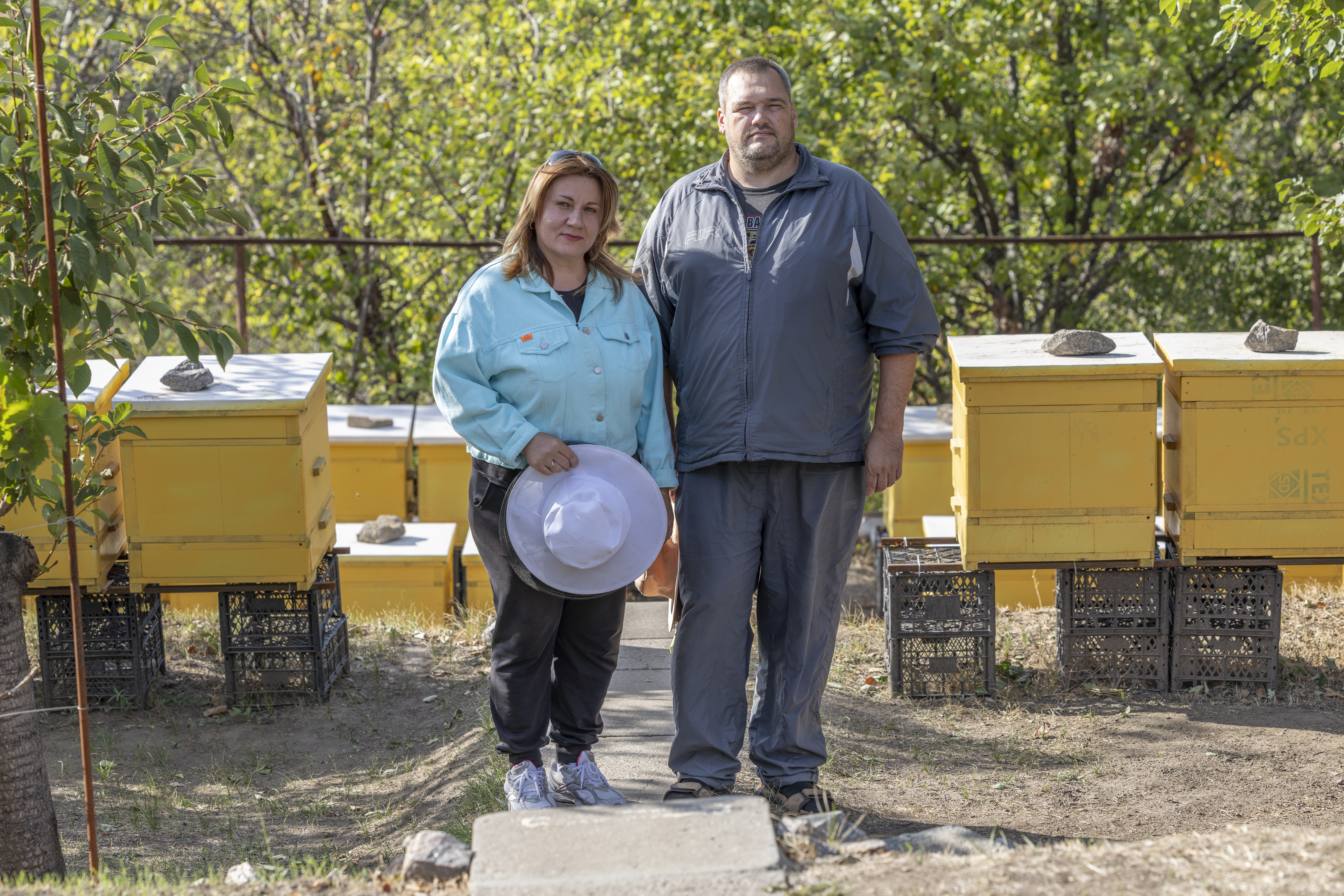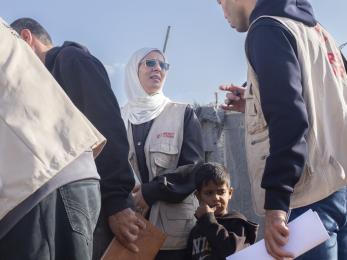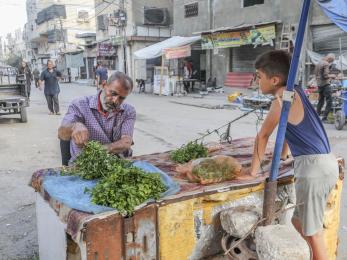"Something like this can happen to any of us": An interview with one of our humanitarian responders
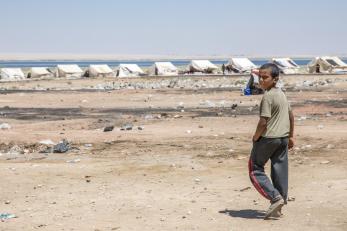
The impact of a crisis like war or natural disaster can be devastating. Many people and even entire communities lose everything in these situations: shelter; income; access to food, water and medicine; education; and loved ones. And the resulting instability — whether the risk of violence, a crippled economy, the loss of infrastructure or the threat of disease — can make survival, let alone the future, uncertain.
In these critical moments, our humanitarian teams are called to action, expertly providing communities with assistance to meet their basic needs, cope with the hardships in front of them and begin the onerous work of rebuilding their lives, when the time comes.
As a career emergency first responder, Mercy Corps’ Sonal Shinde has helped people survive and recover through tsunamis, earthquakes, war, hunger, displacement and more. Today, she serves on Mercy Corps’ humanitarian leadership and response team as the regional team leader for Africa. In this role, Sonal leads humanitarian responses in Africa and supports country teams in their own responses when crisis erupts. She also helps guide humanitarian strategy, coordination and response plans for countries in the region.
In the Q&A below, learn about Sonal’s experience responding to disasters around the world and discover her perspective on why humanitarian work is so important.
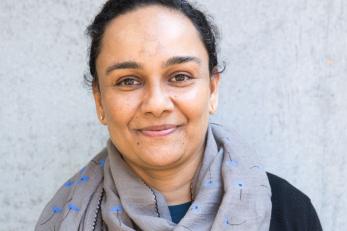
How did you get into emergency response work?
It was sort of accidental. I was working for a University of Texas programme in a government hospital in Mumbai, but was looking for a change, and one of my colleagues recommended me for a job with CRS (Catholic Relief Services). Incidentally, the earthquake happened in Gujarat [India] in 2001, and they said ‘we need you to go.’ I told them I couldn’t do front-line work — I was totally burned out — so they said go for two weeks and then come back. So I went for two weeks — and stayed for two years!
If I look back on my life, I feel like everything was bringing me to this. To give an example, in school plays I always played the social worker or the leader who brings social change. I always got those roles. I guess it was meant to be.
What drew you to Mercy Corps?
Prior to Mercy Corps, I was working in Nairobi with a U.N. agency. It was interesting, but it was desk-based and did not take me to the field. I took a year off to deal with a family emergency and after that decided that I wanted to join an organisation in the field. It was not supposed to be permanent. I thought I would come back to a desk job because I had commitments to my family, and the same thing happened when I joined Mercy Corps that happened before.
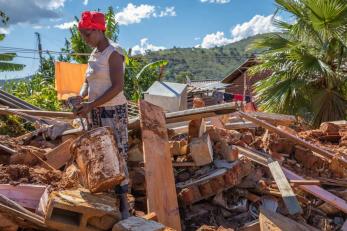
I got in [on the Darfur crisis response], I loved the people I worked with and I felt motivated to be with them and take the work on fully. The way the team there approached it — it felt like everybody was taking personal responsibility. They had passion. It was very fulfilling. And also being around different cultures was special. At that time we had an Irani, a Romanian, an Englishman, Kenyans and Somalis! It was such a wide-ranging group, but we got along so well. It made me feel like the world was my home. I committed for a year but I came back and stayed for over two years.
What crises or disasters have you responded to in your career?
I have been a part of various humanitarian responses, but specifically with Mercy Corps I have supported the Darfur crisis in the beginning days, tsunami response in Sri Lanka, the earthquake in Haiti, responses in Libya, Yemen, Bangladesh and northern Syria, and the migration response in Turkey, Greece, Serbia and North Macedonia. I’ve also supported programmes in northeast Nigeria, South Sudan and Sudan, and I’m currently supporting Yemen again.
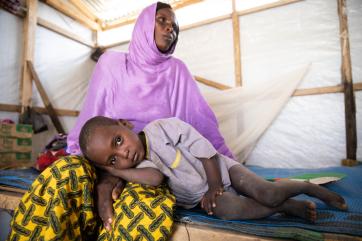
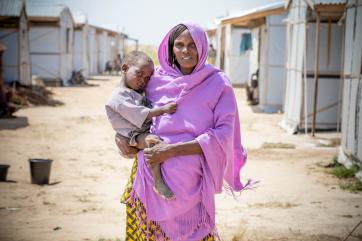
What motivates you to do this work?
The benefit of being with the humanitarian response team for me is I am able to step in and quickly bring the agency to the issue. When we respond, we respond in a particular way and that's our specialty. It's not about just giving shelter, it's about how we do our work and how we connect with the rest of the communities. And because it's a short mission I don't need to worry about conserving my energy. I can be there 150 per cent.
Also, there's a lot of learning involved, because each Mercy Corps country team does things a different way; they have special innovations to respond. They don't talk about it, because for them it's no big deal, but for me, those things can be fabulous tools. Then I am able to take them from one place to the next.
What are you most proud of in your work with Mercy Corps?
We have great field teams in Mercy Corps. National team members who respond to disasters while experiencing the disaster personally are heroes in my mind. I feel proud when I have an opportunity to work with these field teams.
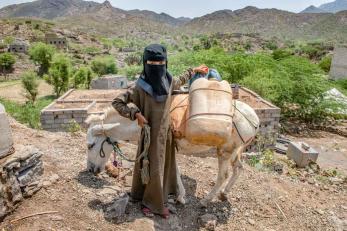
The team in Yemen is just one example. Access is a big issue there, and getting things in and out is not easy at all. So they are constantly at it, trying to negotiate to get our food vouchers in or anything else that is needed, specifically our mobile clinics and water trucks. It needs diplomacy and perseverance, and our team really persists to get the work done.
There is an area where our mobile clinics can’t function because they don’t want vehicles driving around. So at one point a couple years ago the team was carrying all the [medical] kits on their shoulders and going door to door with doctors and nurses. And Yemen is not a cold place. It's hot, it's barren, especially in the areas they were in, and the walking distance between homes is significant. This is the personal responsibility they take for their work, saying ‘I'm going to find a way, even if it’s going to be more trouble for me.’ It cannot go unnoticed. It’s impressive.
What is the hardest part about working in crisis or emergency contexts?
The hardest part of working in crisis is to be able to lift one's head up in the middle of work and see the humanity around. When one can do that, I have seen people really pull through some difficult situations and survive. I also have to acknowledge that its difficult to see external circumstances push people out of their homes without their will and control.
I know for sure in many emergencies, the only time people have left their home is to protect their family and their lives. I have seen people stay despite several bombings and lack of basic services because there is hope and it’s their home.
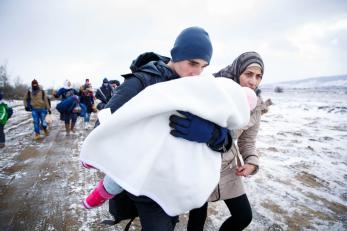
Why is it important for people to care about the crises and disasters that are happening around the world?
It’s important to know that something like this can happen to any of us. Natural disasters can be predicted sometimes, but we have seen that the impact is still immense when it happens. Conflict in peaceful countries now rolls in pretty quickly and sometimes unexpectedly.
The people we support with humanitarian responses are just like us. They have the same aspirations, ambitions and hope for their future. We have to be able to empathise and look at it with the perspective of "What we would we do if it happened to us or our family?" We live in a pretty connected world. If we ignore what is going on out there, it’s possible that we may see it happening in our backyard without due notice.
